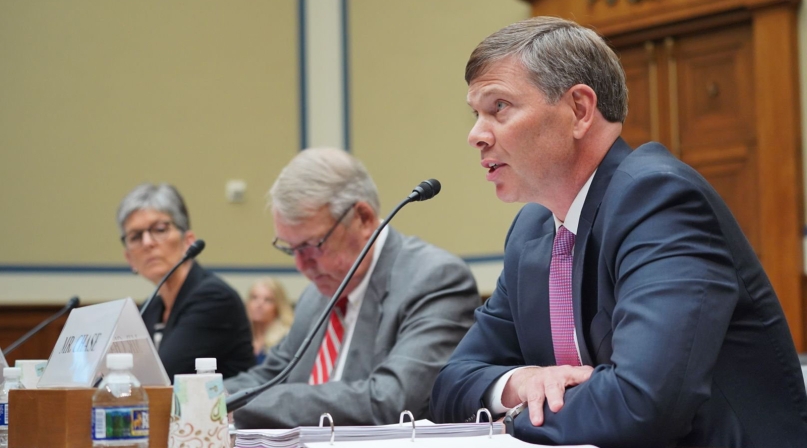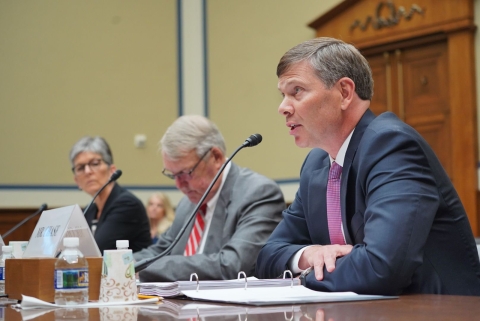NACo CEO: Strengthen government partnerships
Author
Upcoming Events
Related News

Key Takeaways
Establishing a national commission on intergovernmental relations is paramount to finding solutions to the country’s problems.
That was the message delivered to Capitol Hill July 23, when National Association of Counties (NACo) CEO/Executive Director Matt Chase testified in support of a national commission to facilitate intergovernmental collaboration.
Chase testified before the U.S. House Committee on Oversight and Reform and the Subcommittee on Government Operations about the role counties play in the nation’s federalist system.
The hearing, “Restoring the Partnership: The Future of Federalism in America,” discussed the state of federalism in the country and how Congress can improve intergovernmental processes.
https://www.youtube.com/embed/FV3rlJfc850
Chase highlighted ideas for strengthening the intergovernmental partnership for federal, state, local and tribal officials, including the possibility of re-establishing the U.S. Advisory Commission on Intergovernmental Relations.
The Commission on Intergovernmental Relations was established in 1959 to “strengthen the American federal system and improve the ability of federal, state and local governments to work together cooperatively, efficiently and effectively.” It was disbanded in 1996.
Learn More
Chase discussed how national associations of state and local officials support the formation of a new, modern national commission to facilitate improved intergovernmental dialogue, engagement and problem solving.
As the country faces public policy challenges, Chase noted, the nation needs the collective efforts of governments working together to solve problems. He specifically referred to the future of work, cybersecurity, disaster mitigation, transportation, infrastructure, dealing with the nation’s aging population, the crisis with substance abuse and the challenges with uneven economic growth as public policy challenges.
“We must pursue a more modern, practical approach to forging intergovernmental partnerships with an emphasis on solutions,” Chase said. “After all, government works best when we work together and this includes with our colleagues in the private, nonprofit, academic and philanthropic sectors.”
Prior to the hearing, Rep. Gerry Connolly (D-Va.), who serves as chairman of the Subcommittee on Government Operations, and Rep. Rob Bishop (R-Utah) introduced the bipartisan Restore the Partnership Act, which would establish a national commission on intergovernmental relations.
Chase said the Restore the Partnership Act is an essential pillar in rebuilding and rebalancing the nation’s intergovernmental system.
According to Chase, two areas of interest to national associations representing state and local officials include creating the commission on intergovernmental relations and updating the Unfunded Mandates Reform Act, which would ensure that a bill does not include an unreasonable unfunded mandate on state and local governments as well as a transparent consultation process for federal rulemaking involving state and local governments.
“We are long overdue for a new infusion of thinking and commitment to improving our nation’s intergovernmental principles and practice,” he said.
Chase said for counties, a significant challenge with the federal government is dealing with rules and regulations.
“We’re not always here asking for money,” he said. “In fact, we’re asking for relief.”
Counties and other local governments do not want to be treated as special interest groups and seek a continuous and transparent process when it comes to forming rules and regulations, he said.
“Right now, we don’t even have a seat at the table,” Chase said.
“Particularly in the rule-making process, we are being treated like the general public rather than intergovernmental partners.”
As an example, he explained that federal changes eliminated the advance refunding of municipal bonds, which has constrained fiscal options for county governments.
“We have many things that aren’t federal dollars,” he said. “It’s actually more federal guidelines and regulations and handcuffing our ability to be flexible at the local level.”
Forming a commission would be beneficial to having a dialogue about issues that have federal, state and local intersections such as elections, where counties pay the majority of the costs of election equipment, Chase said.
“We aren’t asking for the federal and state governments to just bail us out, but oftentimes those mandates are imposed and we do have to carry those out often in quick time frames where you can’t adjust your tax base,” he said.
Chase testified alongside Teresa Gerton, the executive director of the National Academy of Public Administration and Carl W. Stenberg, a James E. Holshouser Jr. distinguished professor of public administration and government at the School of Government at the University of North Carolina at Chapel Hill.

Attachments
Related News

U.S. House passes final minibus funding package
Congress introduced the final FY 2026 Appropriations package, including key county priorities related to transportation, housing, health, emergency management and public safety

U.S. Congress passes minibus funding package
U.S. House and Senate appropriators passed a “minibus” appropriations package containing Fiscal Year (FY) 2025 Interior-Environment, Commerce-Justice-Science and Energy-Water spending bills.

